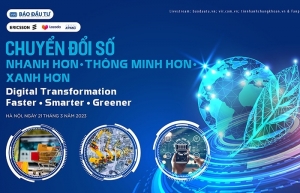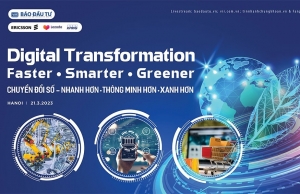Sweden leading in green, digital goals
How has digital transformation helped Swedish businesses to be faster, smarter, and greener?
 |
| David Lidén, trade commissioner of Sweden to Vietnam |
The value of digital is always different for every single organisation, so giving a general answer is difficult. However, digitalisation’s contribution to overall business performance is almost always related to using digital platforms to increase the efficiency and effectiveness of daily operations. Using the fact that you can connect people within the organisation for each business process will reduce waste, which is key to becoming greener.
In addition, you have more advanced digital players whose products help other companies become faster, smarter and greener. An example of this is Ericsson, which provides solutions for connecting not only people, but automated machinery and systems to support efficient operations through their 5G solutions.
A typical example of partnering within digital among Swedish business is on simplifying administrative work. Sweden, along with other EU members, has recognised the legality of e-signatures since 2000 under the Qualified Electronic Signatures Act. This helps immensely when it comes to signing, archiving, and tracing important documents such as labour contracts or service contracts.
What market factors and supporting policies are needed to help businesses in Vietnam accelerate digital transformation more efficiently?
Sweden built up policies and sets of practice around digitalisation based on five pillars: competence, security, innovation, leadership, and infrastructure. We have spoken a lot about equipping the population with at least basic digital skills, which means that the Swedish educational system consistently needs to review and revise curricula to adopt the latest technologies. The programming courses I took at university in the 2000s still exist, but are teaching entirely different programming languages and methods today.
Another important piece of the puzzle is promoting increased data transparency. Doing business in Vietnam in compliance still requires a fair share of physical paperwork in the mix with partial digital, causing issues in syncing and centralising data. To support this, clarity on data protection also needs to be bolstered.
Upgrading data protection would help businesses and governmental bodies plan with confidence. Actions needed to improve data protection include standardising the framework for data protection among authorities, firms and the widespread community; emphasising data protection in education; and upgrading digital infrastructure to reduce the infrastructure gap among provinces.
What should Vietnam do to strengthen partnerships to help promote digital transformation and sustainable development, thus driving the country’s next wave of sustained socioeconomic development?
Digitalisation must be embedded in all aspects of the society to be impactful. One example is the use of e-commerce to increase consumer exposure. We are talking about the partnership of not only sellers, e-commerce platform providers, online payment service providers, and government agencies overlooking these online activities but also the educational institutions and households that have provided the digital exposure to generations of consumers.
To form an effective nexus to spread the adoption of digital, strategies, and action plans, financing programmes need to be deployed drastically with great focus and clear goals to get all social actors involved in the digital transition. What the Swedish government has done to boost the digital revolution is to recognise and provide guidance and practical support to key stakeholders, including innovation hubs, academia, enterprises of different products and services, and governmental bodies to perform their function in the digital economy ecosystem.
The Swedish digital transformation campaign covers not only the national level, but also regional and global. Swedish companies around the world seek to participate in both an individual and group capacity to inform and support local communities with the best possible practices to foster a sustainable vision.
In Vietnam, Ericsson has been working closely with mobile operators in trialling 5G capabilities with initial 5G pilots since 2020. Ericsson is also one of the five companies in the Sweden-Vietnam Energy Alliance, alongside ABB, Hitachi Energy, Hexicon, and Linxon, advising the integration of renewable energy in the national energy plan.
Other investors such as Tetra Pak, Assa Abloy, Polarium, and Hestra adopt sustainability as their operation motto and work to become local pioneers, such as by opting for a green set-up and implementing sustainable practices among staff members in daily operation. Swedish solution providers of standardised management system are also ready to work with Vietnamese industry to figure out best practice.
The philosophy here is to create the stepping stones from adopting best practice from precedent cases, assessing the outcomes and investing in amplifying effective solutions.
 | VIR to host 2nd digital transformation forum on March 21 Policymakers, international organisations, and domestic and foreign businesses will gather at the 2nd digital transformation forum on March 21 to discuss possible routes to a faster, smarter and greener future. |
 | Strengthening ties to enable a greener digital transition Vietnam is ramping up its digital evolution with a raft of new policies, strategies, and legal tweaks. |
 | Expanding across borders to close the digital gap In 2023, the Ministry of Information and Communications (MIC) will launch a campaign to support digital technology businesses that are doing business abroad or want to do so. |
What the stars mean:
★ Poor ★ ★ Promising ★★★ Good ★★★★ Very good ★★★★★ Exceptional
Themes: Digital Transformation
- PM sets five key tasks to accelerate sci-tech development
- Ho Chi Minh City launches plan for innovation and digital transformation
- Dassault Systèmes and Nvidia to build platform powering virtual twins
- Sci-tech sector sees January revenue growth of 23 per cent
- Advanced semiconductor testing and packaging plant to become operational in 2027
Related Contents
Latest News
More News
- Ho Chi Minh City launches plan for innovation and digital transformation (February 25, 2026 | 09:00)
- Myriad risks ahead, but ones Vietnam can confront (February 20, 2026 | 15:02)
- Vietnam making the leap into AI and semiconductors (February 20, 2026 | 09:37)
- Funding must be activated for semiconductor success (February 20, 2026 | 09:20)
- Resilience as new benchmark for smarter infrastructure (February 19, 2026 | 20:35)
- A golden time to shine within ASEAN (February 19, 2026 | 20:22)
- Vietnam’s pivotal year for advancing sustainability (February 19, 2026 | 08:44)
- Strengthening the core role of industry and trade (February 19, 2026 | 08:35)
- Future orientations for healthcare improvements (February 19, 2026 | 08:29)
- Infrastructure orientations suitable for a new chapter (February 19, 2026 | 08:15)

 Tag:
Tag:


















 Mobile Version
Mobile Version